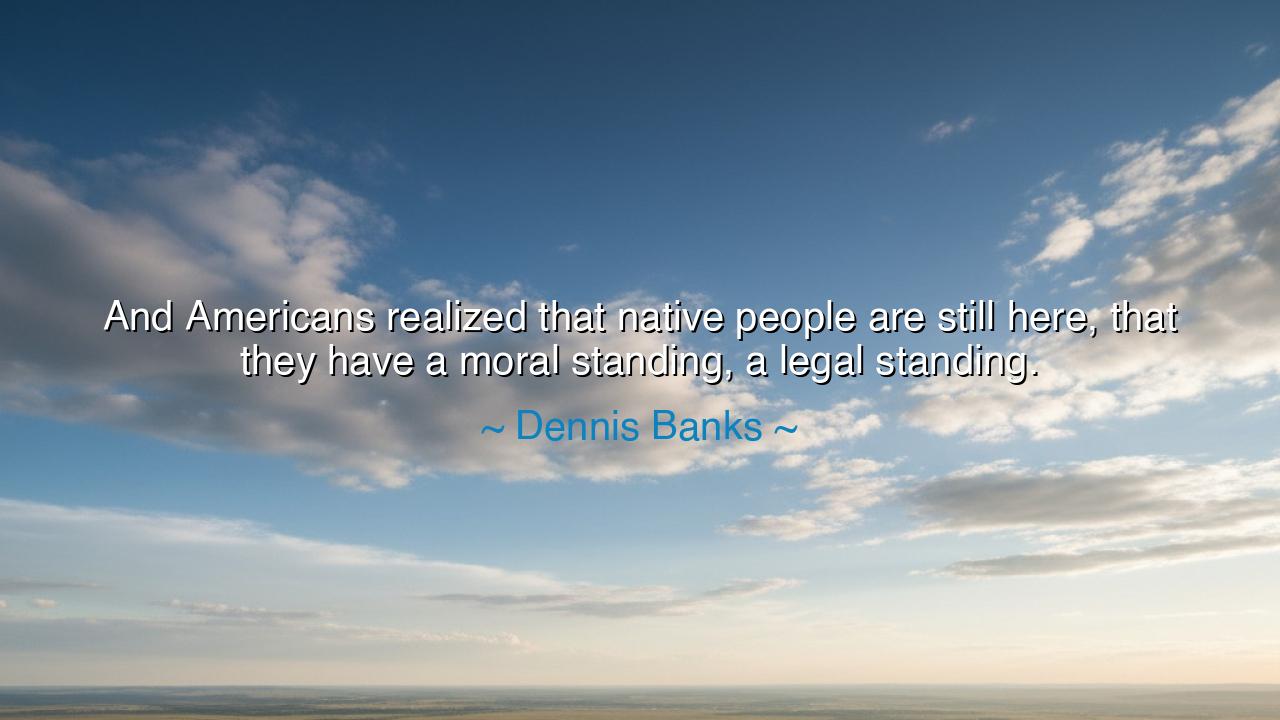
And Americans realized that native people are still here, that
And Americans realized that native people are still here, that they have a moral standing, a legal standing.






Hear, O children of memory and of destiny, the voice of Dennis Banks, a warrior of the American Indian Movement, who declared: “And Americans realized that native people are still here, that they have a moral standing, a legal standing.” These words are not lightly spoken, but carved from centuries of struggle, erasure, and endurance. They are the testimony of a people long silenced, who yet endure upon the land of their ancestors.
For too long, the tale of the native people was told as though it had ended, as though they were shadows swallowed by the march of conquest. In books, they were spoken of in the past tense, as relics of history, their voices hushed, their treaties broken. Yet the truth—like the rivers and the mountains—endured. They did not vanish, but remained, carrying forward their languages, their traditions, their prayers to the Creator. Banks’ words remind the world of this enduring presence, that they are still here, not ghosts but living nations.
The power of his statement lies also in the recognition of moral standing. This means that native peoples are not merely survivors, but bearers of rights and of dignity. Their voice is not that of supplicants begging for mercy, but of equals demanding justice. It is an echo of the ancient principle: that all peoples, by virtue of their humanity, hold a sacred claim to respect. To deny this is to deny one’s own humanity. And with legal standing, Banks points to the truth that their treaties, their laws, their rights, though trampled, still hold weight before the conscience of nations and the courts of men.
Consider the story of Wounded Knee in 1973, where Banks himself stood among his people, demanding recognition and justice. Surrounded by federal agents, the Lakota and their allies declared that they were not relics but nations, still alive, still sovereign. The world watched as this stand revealed the ongoing struggles of Native America. Out of that moment, many who had believed the native peoples vanished were forced to confront the truth: that they endure, and that justice delayed is not justice erased.
This awakening parallels older histories. Think of the Jewish people, scattered and oppressed for centuries, yet never extinguished, carrying their identity through time until the world once more recognized their endurance and their rights. So too with the native nations of America, who have walked through fire, dispossession, and silence, yet who rise still, bearing witness that they live, and that they shall not be forgotten.
The lesson, then, is profound: never accept the false tale that any people is gone, invisible, or irrelevant. For every culture, every community, holds a flame that, though dimmed, may yet blaze. To recognize the moral and legal standing of others is to honor the sacred web of humanity, where no voice may be cut away without wounding the whole.
Therefore, O listener, take this teaching into your own heart. Learn of the peoples who dwell beside you, not as fragments of the past but as living nations with wisdom to share. Support their rights, honor their treaties, and stand with them in the struggle for justice. In your speech, in your actions, affirm their presence. For in doing so, you walk the path of truth, joining hands with those who refuse to vanish.
So let Banks’ words echo across the generations: that native people are still here, unbroken, bearing both moral weight and legal claim. To forget this is to walk in blindness; to remember is to step toward justice. May we, then, be among those who remember, who honor, and who act, so that the nations of the earth may endure in dignity, side by side, beneath the same sun.






AAdministratorAdministrator
Welcome, honored guests. Please leave a comment, we will respond soon